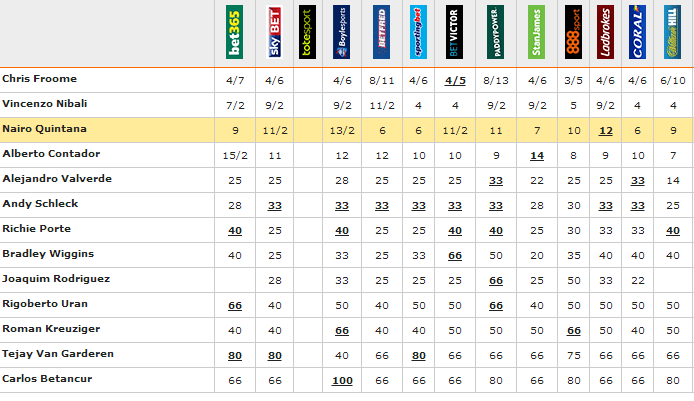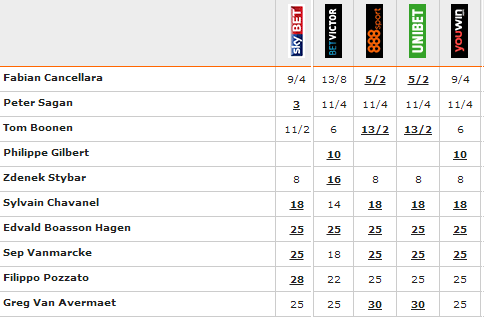The Basics of Betting on Cycling - Part I
Betting with Fixed Odds
If you are reading this you are probably a lover of cycling but may not have ever placed a bet on it before.
If you enjoy watching professional cycling and think you know your stuff, you have probably at one point or another said, I fancy X or Y to win a particular race, a stage race overall or jersey competition for example. But if you have never placed a bet on your opinions and predictions, I am here to help you get your head around it and maybe place your first winning bet!

An example of the Fixed Odds prices available on the 2014 Tour de France on 5th January 2014
Like all sports, there are a huge number of bookmakers offering odds now on cycling races. The bigger the races, the more 'markets' they offer. Even though it can be hard to get someone that offers betting on some smaller events, the numbers of markets being offered by bookies these days is far more than even a few years ago and they now offer all sorts of different ways to bet on cycling. From the overall stage or race winners markets to more unusual markets like the number of finishers in the Tour de France or how many stages Mark Cavendish will win in the Giro D'Italia.
There are two main ways to bet on Cycling - with the regular bookmakers and with the betting exchanges. The regular bookmakers are of course the Paddy Powers, Ladbrokes, Bet365s and so on that are household names these days. They offer fixed odds prices - for example 2/1 on Peter Sagan winning a stage and depending on the bookmaker can offer a wide range of markets to bet on, including a selection of match bets which you can put in an 'accumulator', more on that later.
The betting exchanges are the likes of betfair and Betdaq. Betting exchanges offer decimal 'back' and 'lay' prices to bet on and you can bet for an event happening by taking the 'back' price (such as Garmin Sharp winning a team time trial) or you can bet against something happening by taking the 'lay' price (such as Cavendish not winning a sprint stage). This is where the exchanges are great for cycling betting - you may not know who will win a stage, but you may have a strong opinion that a certain rider, maybe even the favourite, will not win the stage. You can therefore bet against him and have the field running for you!
Fixed Odds Betting:
Fixed odds is the traditional way of placing bets on an event. A bookmaker will offer prices on most of the riders in a race and if you fancy a rider to win you back them at the quoted price. Different bookmakers can offer very different prices on the same rider. This can be because of reasons such as their cycling odds compiler having a strong opinion of particular riders and their chances of winning, or possibly the weight of money might force them to cut their prices if lots of customers look to back the same rider. Fortunately there are more and more bookies prepared to price up major cycling events and it can really pay to shop around for better prices, something I try to help you with by pointing out good value on my posts.
For example, the current odds on the 2014 Tour of Flanders looks like this, with four bookies offering prices (888 and Unibet are the same company). As of 3pm 06/01/2014:

In general, the 'favourites' are pretty much the same price across the board, but you can see that betting with BetVictor (13/8) instead of SkyBet (9/4) would see you win only £32.50 versus £45 with SkyBet. Betting with 888 or Unibet would return even more, a £50 profit for the same £20 bet, a 53.8% difference just by shopping around.
As you move down the list you can see that some prices can be dramatically different between bookies, such as the 16/1 for Stybar with BetVictor, he is 8/1 with the other bookies. Vanmarcke ranges from 18/1 to 25/1. A £10 bet with BetVictor would yield £70 less profit than with the other bookies. So it is clear it pays to shop around, especially if you fancy some of the lesser fancied riders, there can be odds such as 150/1 offered on riders that are 66/1 or 50/1 elsewhere.
Please note though that as the race comes nearer there will be far more bookies pricing up the race, as the likes of Bet365, William Hill, Coral, Paddy Power and more will all offer odds. So there should be even more opportunity to pick out the mispriced riders.
The other thing to bear in mind too though is that generally a mispriced rider may not stay at that price for very long if people start backing him - for example, if lots of people suddenly started backing Stybar, it wouldn't be long before BetVictor would cut him to bring him to a price closer to the 8/1 he is elsewhere (which incidentally is a terrible price if you ask me, he should be 16 or 20/1!).
For the very big races like the grand Tours the bookmakers offer a whole host of markets to bet on. From the standard 'Winner' Market to more unusual markets like 'Betting without (Froome)' where you can bet on who you think will come second in the Tour (but your bet also wins if your choice beats Froome and wins overall), to the Green Jersey, Points Jersey, White Jersey winners, winners winning time margin, team prize, umber of finishers and so on.
On individual stages/ bigger races you will get the winners markets and sometimes place only (top 3) markets too. On the win market you can bet 'win only' or 'each-way'. 'Win Only' does exactly as it says, you bet £10 on Rodriguez to win at 5/1, if he wins, you get £60 back - £50 profit plus your £10 stake back. If he doesn't win, you lose your £10 and win nothing.
With an 'Each-Way' bet, you can bet that your rider will come first, second or third. You are effectively placing two bets with an 'each-way' bet - one bet that the rider will win, and another bet the rider will finish in the top 3. The bookies will usually pay out 1/4 the odds for coming in the first 3 for the place bets (but sometimes this can be 1/5 or 1/3, make sure you check the terms). What this means is that if you backed Stybar 'each-way' at 16/1, the bookies will pay out 4/1 if he finishes in the top 3, and if he wins they pay out the 16/1 winning bet too. so your bet would be
£10 'Each-Way' at 16/1 would be a total stake of £20, £10 on the win, £10 on the place.
If Stybar wins, you will win £10 x 16 = £160, plus your £10 stake back for a total win return of £170.
As he finished in the Top 3 too, you will also get paid out on 1/4 of 16/1 or 4/1 for the place, times your stake of £10. That is £40 profit, plus your £10 stake back.
This brings a total of £200 profit plus your £20 stake back also.
Should Stybar finish just second or third, you just get paid out on the place bet of £10 at 4/1. So your return is £50 (£40 profit plus £10 stake back) but you lose on your win bet of £10. Therefore, your return is £50 for a £20 investment, should your rider finish in the top 3.
The other way to bet on the result as I mentioned above is to bet on the 'Place Only' or 'Top 3' market as it is often known. Here, you can bet on the rider to just finish in the top 3, not just win it. Naturally the odds are much lower, as you are not losing your win stake part of an 'Each-Way' bet, and the odds on offer are typically around 1/5th of the win odds. So a rider that is 25/1 to win might be offered at just 5/1 to finish in the top 3. Shorter priced runners can become a very short price to finish in the top 3, for example, a rider around 2/1 to win the race might be only about 1/2 to finish in the top 3..
Match Bets
The final element the fixed odds bookies offer for most races are match bets. Match bets are basically a set of pairs that the bookies have priced up and you have to decide who will win their little 'match bet' or side race within the race. It doesn't matter if they finish 1st and 2nd or 101st and 102nd, as long as one beats the other. So for example, for a match bet between two similar sprint rivals like Greipel and Kittel, the bookies might offer odds on the match bet something like as follows:
Kittel - 4/7
Greipel - 6/4
If you think Kittel will beat Greipel you would back him at 4/7 - in decimal terms, this is reflected as 1.57, meaning that if you bet £10 on Kittel, you would win £5.70 in profit, plus your £10 stake back. Alternatively, if you think Greipel will beat Kittel, a £10 win would return £25 (£15 profit + £10 stake back).
Where match bets can become very rewarding is when you can identify 2, 3, 4 or more match bets that you think can win and then put them in an accumulator bet, that is where the odds multiply up depending on the number of selections you choose. So lets say for example you pick 3 match bets you fancy at 4/6, 11/10 and 4/5 and place a £10 accumulator bet on them and they all win their respective match bets. Remember, it doesnt' matter where in the field they finish as long as they beat their match bet rival!
The way the accumulator works is that the first result gets multiplied by the odds of the second result and then the 3rd result and so on so the returns can very quickly accelerate. So in this example, if you had £10 on the treble described above, the result would work out as follows:
£10 X 4/6 = £16.67
£16.67 X 11/10 = £35.00
£35.00 X 4/5 = £63
So your final return would be £63, making it a profit of £53, or a return of 5.3/1
